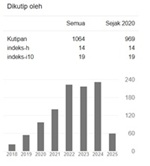PENERAPAN MODEL PROBLEM BASED LEARNING UNTUK MENINGKATKAN PEMAHAMAN SISWA PADA MATERI TRIGONOMETRI
Abstract
Keywords
Full Text:
PDFReferences
Andriani, T,. dkk. (2017). Analisis Kesalahan Konsep Matematika Siswa dalam Menyelesaikan Soal Trigonometri Kelas X Tkj Smkn 1 Gempol Tahun Pelajaran 2016/2017. Pi: Mathematics Education Journal, 1(1). 34-39.
Angkotasan, N. (2014). Keefektifan Model Problem Based Learning Ditinjau Dari Kemampuan Pemecahan Masalah Matematis. Delta-Pi: Jurnal Matematika dan Pendidikan Matematika, 3(1). 11-19.
Arikunto, S. (2010). Prosedur Penelitian Suatu Pendekatan Praktik. Jakarta: PT Rineka Cipta.
Departemen Pendidikan Nasional. (2003). Undang-undang Nomor 20 Tahun 2003 Tentang Sistem Pendidikan Nasional. Jakarta: Depdiknas
Depdiknas. (2004). Peraturan Tentang Penilaian Perkembangan Anak Didik Nomor 506/C/Kep/PP/2004. Jakarta: Dirjen Dikdasmen Depdiknas.
Kementerian Pendidikan dan Kebudayaan. (2016). Materi Pokok Pelatihan Implementasi Kurikulum SMA Mata Pelajaran Matematika (Umum). Jakarta: Direktorat Pembinaan Sekolah Menengah Atas.
Lestari. (2016). Efektifitas Penerapan Model Problem Based Learning Ditinjau Dari Penalaran Matematis Siswa. Jurnal pendidikan Matematika Unila, 4 (5). 34-47.
Ngalim, Purwanto. (2006). Prinsip-prinsip dan Teknik Evaluasi Pengajaran. Bandung: PT. Remaja Rosdakarya.
Purwanto. (2013). Evaluasi Hasil Belajar. Yogyakarta: Pustaka Pelajar.
Sanjaya, W. (2009). Strategi Pembelajaran Berorientasi Standar Proses Pendidikan. Jakarta: Prenada
Santoso, B. (2016). Penerapan Model Problem Based Learning DalamPeningkatan Pembelajaran Matematika. Kalam Cendekia, 4(6.1). 713-718.
Siswanto. (2009). Theory and Application of Mathematics: For Grade X of Senior High School and Islamic Senior High School. Solo: Tiga Serangkai.
Sudjana, N. (2010). Penilaian Hasil Proses Belajar Mengajar. Bandung: PT Remaja Rosdakarya.
Sugiono. (2012). Metode Penelitian Pendidikan: Pendekatan Kuantitatif, Kualitatif, dan R&D. Bandung: Alfabeta
Trianto. (2009). Mendesain Model Pembelajaran Inovatif Progresif. Jakarta: Kencana Predana Media Group
Wulandari, B. (2013). Pengaruh Problem Based Learning Terhadap Hasil Belajar Ditinjau Dari Motivasi Belajar PLC Di SMK. Jurnal Pendidikan Vokasi, 3(2). 178-191.
Zarkasyi, W. (2016). Penelitian Pendidikan Matematika. Bandung: Refika Aditama.
DOI: http://dx.doi.org/10.53712/sigma.v7i1.1267
Refbacks
- There are currently no refbacks.
Indexed by:
Published by Prodi Pendidikan Matematika FKIP Universitas Madura
Jl. Raya Panglegur Km 3,5 Pamekasan
Phone: (0324) 322231
website: http://http://ejournal.unira.ac.id/index.php/jurnal_sigma/index
Email: math@unira.ac.id

SIGMA by Universitas Madura is licensed under a Creative Commons Attribution 4.0 International License.

2.jpg)











